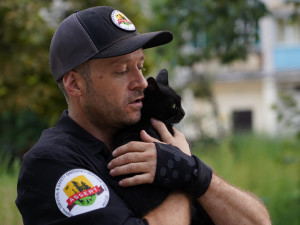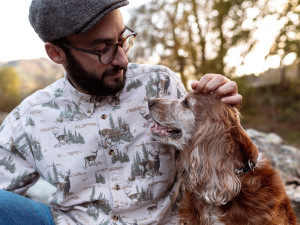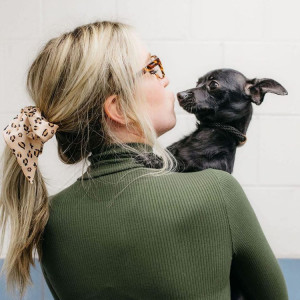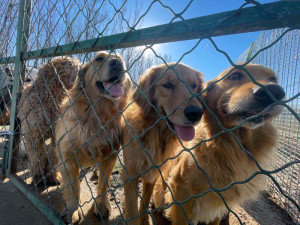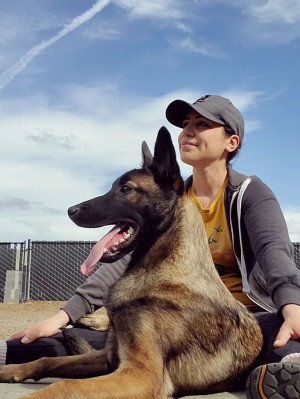How to Turn Your Vacation Into an Opportunity to Help Local Rescue Animals
Split your time sipping cocktails by the beach and being a “voluntourist” for puppies and kittens in need.
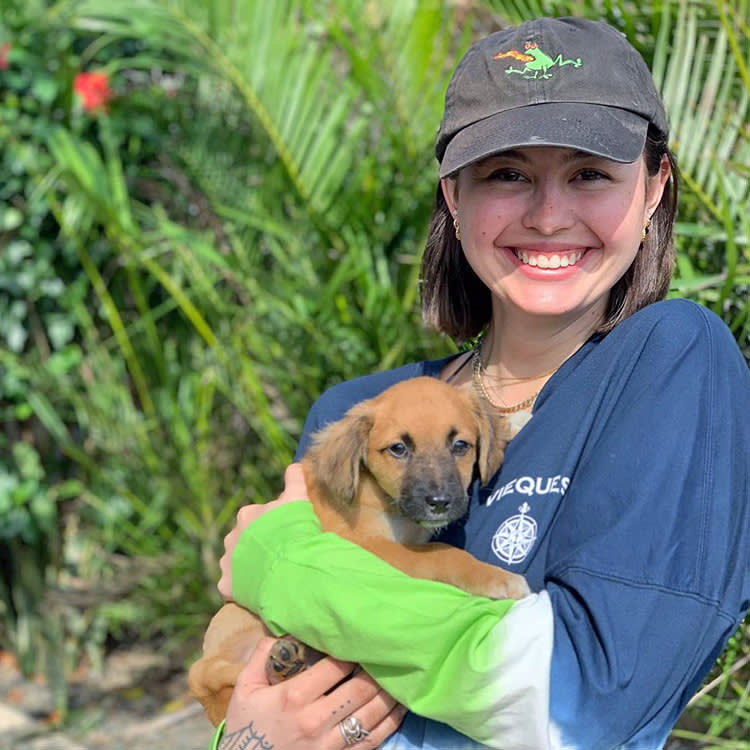
Share Article
I’ve never been one to generalize. That being said, tourists can be a bit of a nuisance for locals — in general. As someone who’s spent the majority of his adult life living in New York City, I can confirm tourists tend to aggravate the regulars. They walk slow, ask too many questions, and often sacrifice the peace by abruptly stopping for a photo. Of course, not all forms of tourism are this annoying, and one in particular can do a lot of good for local communities and is designed specifically for that goal. It’s (appropriately) called “voluntourism.”
For these getaways, travelers combine the traditional sightseeing aspects of vacation with the altruistic commitment of volunteering. And there are fewer more noble causes than animal welfare. That’s why rescue organizations across the globe offer volunteer programs for travelers, allowing them the opportunity to vacation while they help dogs and cats in need.

littleKin™ is Kinship’s home just for puppy and kitten parents. Bop over to check out expert advice, new pet tools, and special deals—all curated for your newest family member.
opens in a new tabWhy you should give back during your time away
You have read the above and immediately thought, Dude, I’m on vacation. Why should I do this now? It’s a fair question. Most people would probably opt to chill by the beach on their PTO rather than do physical animal work. But pet parents are a unique breed; we’re built different. Not to mention, these volunteer programs can often be just as rewarding as sipping a Mai Tai while getting a tan.
And I’m not just saying that as a man restricted by hereditarily unshakeable paleness. For those considering such a venture, Natasa Voulgaropoulou asks a simple question, “Why not embark on a journey that not only enriches your own life but also leaves a lasting legacy of compassion and goodwill wherever you go?”
Voulgaropoulou is the owner and founder of Hopeland Dog Sanctuaryopens in a new tab in Thessaloniki, Greece, an organization that helps home stray or abandoned pups in the area. They also host volunteers from all over the world who want to help them pursue their mission while seeing everything Greece has to offer.
“Volunteering with our organization is not just a vacation; it’s a unique experience centered around building connections between people and dogs,” she says. “Here, young volunteers learn invaluable lessons in discipline, autonomy, and responsibility while forming close bonds within our tight-knit community.”
Soi Dog Foundationopens in a new tab runs a similar operation out of Phuket, Thailand, an island teeming with stray animals in need of love and understanding. Currently, the shelter houses and cares for nearly 1,500 dogs and over 400 cats, in addition to providing spay, neuter, and vaccination services to help combat the growing stray population. In 2023, the organization even celebrated its one-millionth animal neutered since opening in 2003. Soi Dog volunteers traveling to Thailand are primarily tasked with simply socializing the dogs and cats, though.
Beyond the friendships you’re destined to make with fellow voluntourists and animal bonds you’ll surely form, Christine Miles, the shelter’s visitor and volunteer manager, promises mental benefits similar to a classic sandy vacay. “Many of our volunteers say time with the dogs and cats is therapeutic for them as well as the animals. They teach us how to live in the moment and appreciate what we have,” she says.
What volunteers should expect
Qualifications for these endeavors are generally minimal, meaning almost anybody can take on the adventure as long as they love animals and have the means to travel. Soi Dog only asks that volunteers commit a minimum of two days to the shelter and have the energy, patience, and flexibility to work with dogs and cats that, in many cases, have experienced some level of trauma with resulting physical and emotional scars.
At Hopeland Dog Sanctuary, previous animal care experience is certainly welcomed, but it’s not mandatory. As long as volunteers are physically and mentally fit enough to handle the responsibilities and capable of sharing common spaces with others, they’ll be ready to go.
A standard day can look vastly different for volunteers depending on the organization and the work it’s doing, but there’s certainly crossover. Per Voulgaropoulou, Hopeland attendees should expect a variety of tasks including feeding the dogs, managing kennels, and engaging in thorough cleaning duties.
Still, the majority of the time will be spent helping the animals socialize by walking them and interacting with them. Miles notes that Soi Dog is similar in this way; the primary function of their volunteers is to walk and socialize with the dogs. Cat socializing is also a welcomed option here. Another through-line between the groups is that they both end the workday around 4 or 5 p.m., so that volunteers can rest and/or indulge in local nightlife.
Less time-consuming options
Let’s say you don’t want to sacrifice entire days of your well-earned vacation but would still love to make a difference. That’s totally understandable: Most people can’t afford regular extravagant getaways, so you want to fully enjoy yours. There are also less extreme options that require a much slimmer time commitment. Vieques Humane Society and Animal Rescue opens in a new tabin Puerto Rico is one such example.
Most visitors only volunteer for an hour or so unless they opt to keep a pet with them through the night when their accommodations allow it. Cate Johnston, the rescue’s executive director, confirms that it’s still a great way to give back to the local community. It’s also a great family bonding experience.
“A lot of our volunteers are families, and they also tell us it’s important to them to show their children the reality of animal welfare in a vacation destination and give the example of community service,” she says. Johnston explains that dogs in Puerto Rico linger in shelters longer than most pups in the U.S., with an average stay of about 54 days. They have a small staff of only five part-time workers and too many animals in need of attention. “This means our dogs need a lot more stimulation to keep them physically and mentally healthy,” she adds.
As a result, Vieques Humane Society’s traveling volunteers spend their time attending to dogs and cats in the most fun way possible — by giving them attention. They’re tasked with playing with the kittensopens in a new tab to socialize them and taking dogs for walks by the beach and other outings around the island.
You can also indulge in voluntourism without surrendering a minute of your vacation once your flight lands. Many organizations, like Soi Dogopens in a new tab, offer opportunities to accompany animals on their way to their new homes. If you already have your flight booked, Soi Dog can connect you with animals in need of transport overseas. The rescue handles all of the logistics, setting up the dog or cat as your additional baggage on your flight. Once you land, you meet up with the group taking the animal in and hand them off. Then, you’re on your way.
How voluntourism makes a difference
Above all, every version of volunteer vacationing helps improve the lives of animals in need from every corner of the world. By volunteering your time and travel accommodations, you can make a massive difference by providing essential care and attention to dogs and cats who lack enough of both.
“Through their dedication and hard work, volunteers ensure that the animals receive proper nutrition, exercise, and socialization, improving their overall wellbeing,” Voulgaropoulou says. She adds that volunteers play a crucial roleopens in a new tab in maintaining clean and safe living environments for the animals, which helps prevent the spread of disease and alleviates overcrowdingopens in a new tab.
On a more granular level, offering your time helps alert others to these issues and positively affects their perception of them. “Volunteers contribute to raising awareness about animal welfare issues through their actions and interactions with their community, ultimately promoting a culture of compassion and respect for animals,” Voulgaropoulou says.
This, in turn, further promotes the biggest goal among all of these organizations: You find these rescues homes. “Not only do they enrich their lives while living here and healing from whatever trauma led to them becoming a resident, but they also help to socialize them, which increases their chances of adoption,” Miles explains, before adding that many volunteers even end up adopting one of the animals they were working with.
Additional volunteer opportunities
In addition to Soi Dog Foundation, Hopeland Dog Sanctuary, and Vieques Humane Society, there are plenty of other organizations that offer similar opportunities, many of which combat issues across the animal kingdom. Below are a few to consider.
Animal Experience Internationalopens in a new tab (Various locations)
Volunteering Solutionsopens in a new tab (Various locations)
International Volunteer HQopens in a new tab (Various locations)
The Might Roaropens in a new tab (Various locations)
Discover Corpsopens in a new tab (Various locations)
Costa Rica Animal Rescue Centeropens in a new tab (Costa Rica)
Headrock Dogs Rescueopens in a new tab (Prachuap Khiri Khan, Thailand)
The Bornean Sun Bear Conservation Centreopens in a new tab (Sandakan, Malaysia)
Bali Animal Welfare Associationopens in a new tab (Gianyar, Bali)
The Kathmandu Animal Treatment Centreopens in a new tab (Nepal)
Zanzibar Animals Affection Societyopens in a new tab (Zanzibar, Tanzania)
Cyprus Pride Houseopens in a new tab (Limassol, Cyprus)
Animal Aid Unlimitedopens in a new tab (Liyo Ka Gurha, India)
Lanna Dog Rescueopens in a new tab (Chiang Mai, Thailand)

Sean Zucker
Sean Zucker is a writer whose work has been featured in Points In Case, The Daily Drunk, Posty, and WellWell. He has an adopted Pit Bull named Banshee whose work has been featured on the kitchen floor and whose behavioral issues rival his own.
Related articles
![Man with beard and wearing glasses and a grey hat sitting outside petting the head of his old foster dog]() opens in a new tab
opens in a new tabFoster Parenting 101: How to Be the Best Caregiver to Your Guest Pets
All the steps you can take.
![A man sitting on the floor with his arm around a dog while working on his laptop.]() opens in a new tab
opens in a new tabHow to Claim Your Foster Pet on Your Taxes
That’s right, you can write off all that puppy food (and pee pads).
![A woman making a kiss face next to a dog.]() opens in a new tab
opens in a new tab10 Brands That Donate to Animal Rescues
Spend your hard-earned cash on fashion, beauty, and lifestyle brands that support worthy causes.
![A brunette woman holding a spotted gray kitten up to her face while its front paws rest on her chin]() opens in a new tab
opens in a new tab10 Foster-Fail Stories That Will Tempt You to Do the Same
Adopting a foster pet doesn’t isn’t always the right choice. But for these families, it turned out to be the only one.
![four dogs from No Dogs Left Behind at a fence]() opens in a new tab
opens in a new tabNo Dogs Left Behind Faces Harsh Realities to Save the Pups Who Need It Most
The rescue organization’s founder Jeff Berri needs your help to save dogs from horrific conditions and giving them a much-deserved new start.
![Saharai “Sada” Salazar and a large Belgian Malinois dog who is part of the Wolfmother K9 Rescue.]() opens in a new tab
opens in a new tabThe Fiction of “Unadoptable” Shelter Dogs
Wolf Mother K9 founder Saharai Salazar on misunderstood behaviors, giving every pup a chance, and the need for more empathy.


